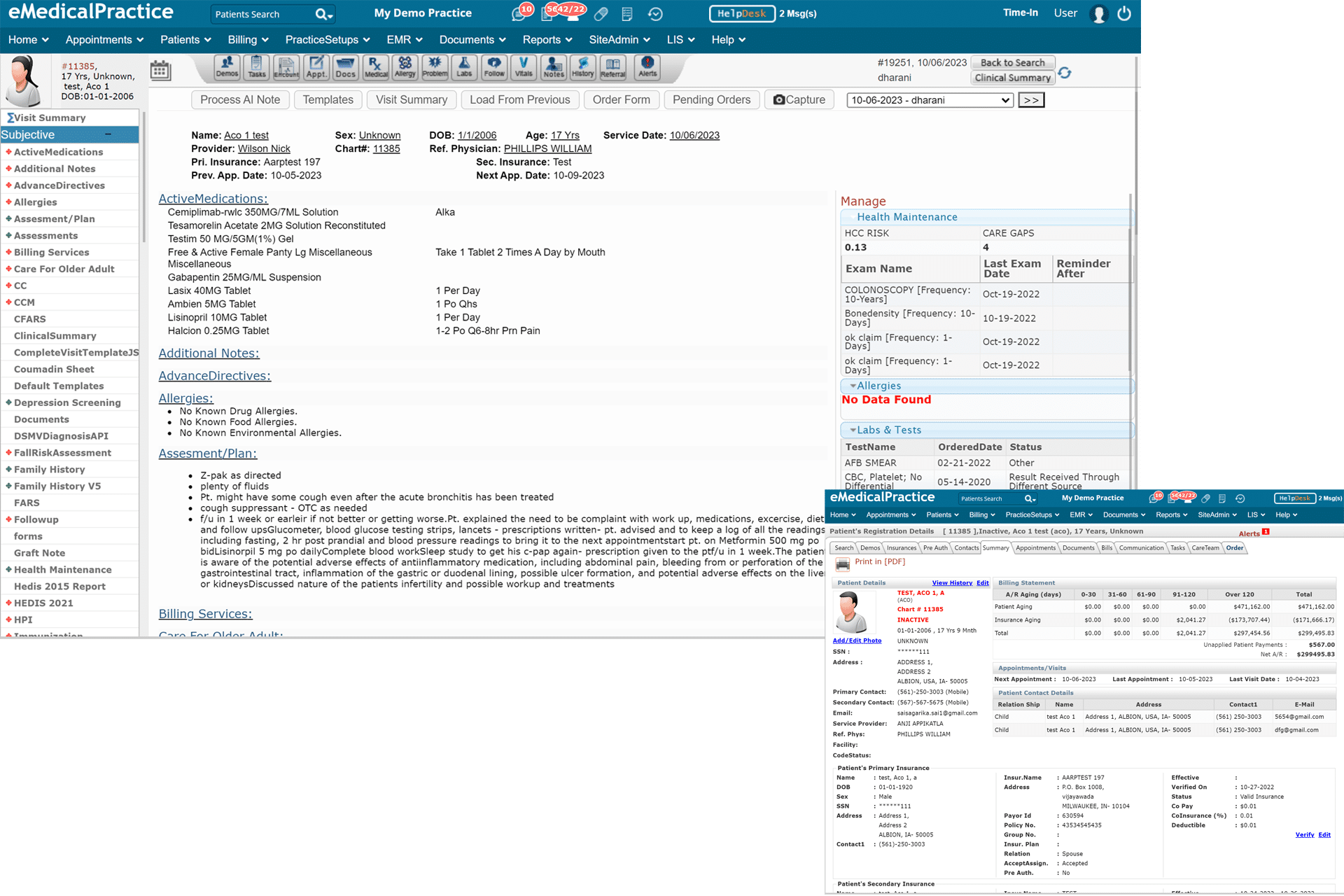Streamline Your Medical Practice with eMedicalPractice
Efficiently Manage Your Medical Practice with our Comprehensive Software Solution
Simplifying Healthcare with Advanced EHR and Seamless Medical Billing Services
At eMedicalPractice, we understand the challenges healthcare providers face in managing patient information efficiently while ensuring accurate and timely billing. That’s why we offer state-of-the-art Electronic Health Record (EHR) applications and expert medical billing services, designed to streamline your practice operations and enhance patient care.

Advanced EHR for Small Practice
Our EHR application is tailored to meet the unique needs of healthcare providers, offering a user-friendly interface and robust features to simplify your workflow. With our EHR system, you can:
Centralize Patient Records: Digitize patient records, medical history, prescriptions, and test results, making it easy to access and update patient information securely.
Enhance Care Coordination: Improve communication among your staff, allowing seamless sharing of patient data, appointments, and follow-up care instructions.
Increase Efficiency: Reduce paperwork and administrative tasks, allowing you to focus more on patient care. Our EHR system automates routine processes, such as appointment scheduling and prescription refills.
Ensure Compliance: Stay compliant with healthcare regulations and standards, including HIPAA, by maintaining accurate and secure electronic records of patient data.
Improve Patient Engagement: Enable patients to access their medical records, book appointments online, and communicate with healthcare providers, fostering active participation in their healthcare journey.
Key Features of EHR Applications
- Patient Demographics: EHR applications store essential patient information, such as name, address, contact details, and insurance information.
Medical History: EHRs maintain a comprehensive record of a patient’s medical history, including previous diagnoses, surgeries, allergies, and family medical history.
Clinical Documentation: EHR applications enable healthcare providers to document patient encounters electronically. This includes progress notes, treatment plans, lab results, and imaging reports.
e-Prescribing: EHRs allow healthcare providers to electronically prescribe medications, reducing errors and improving medication management.
Interoperability: EHR applications support interoperability, enabling seamless exchange of patient data between different healthcare systems and providers.
Auto Patient Reminder: Auto patient reminders are automated notifications sent to patients to remind them of their upcoming appointments. These reminders can be sent via various communication channels, such as SMS text messages, emails, or automated phone calls. The reminders typically include important details such as the appointment date, time, location, and any specific instructions.
Medical Billing for Small Practice
Medical billing is an integral part of the healthcare revenue cycle management process. It involves submitting claims to insurance companies or patients for services rendered by healthcare providers. Accurate and timely medical billing is crucial for healthcare organizations to receive reimbursement for their services.
Revenue Generation: Medical billing ensures that healthcare providers receive payment for the services they provide. It helps maintain the financial stability of healthcare organizations.
Claims Processing: Medical billing involves preparing and submitting claims to insurance companies. This includes verifying patient insurance coverage, coding procedures correctly, and following up on claim status.
Compliance with Regulations: Medical billing must adhere to various regulations and coding standards, such as the Health Insurance Portability and Accountability Act (HIPAA) and Current Procedural Terminology (CPT) codes.
Patient Satisfaction: Efficient medical billing processes result in quicker reimbursement and fewer billing disputes, leading to improved patient satisfaction.

Key Components of Medical Billing
Patient Registration: Collecting accurate patient demographic and insurance information is crucial for successful medical billing.
Coding and Documentation: Medical coders assign appropriate codes to procedures and diagnoses based on documentation provided by healthcare providers. These codes ensure accurate billing and reimbursement.
Claims Submission: Medical billers prepare and submit claims to insurance companies or patients for payment. This involves verifying claim accuracy, attaching necessary documentation, and adhering to specific submission requirements.
Payment Processing: Medical billers reconcile payments received from insurance companies or patients with the billed amount. They handle denials or rejections and follow up on outstanding balances.
Revenue Cycle Management: Medical billing is part of the broader revenue cycle management process, which includes tasks like appointment scheduling, eligibility verification, and accounts receivable management.



